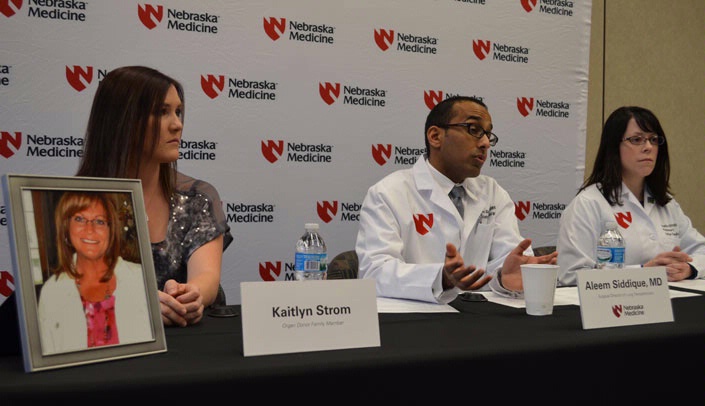After years of planning and preparation, Nebraska Medicine is launching a comprehensive lung transplant program.
Be a donor
In the decades since the first transplant in 1970, Nebraska Medicine’s nationally and internationally renowned specialists have performed thousands of heart, liver, kidney, pancreas and intestinal transplants.
“Nationally, it’s estimated that 18 people die every day while waiting for organ transplants,” said lung transplant surgical director Aleem Siddique, M.B.B.S. “A single donor may save up to eight lives. For the donor or their family, it’s an opportunity for altruism that may be deeply rewarding.”
To register as an organ donor, click here. To learn more about the Lung Transplant Program at Nebraska Medicine, click here.
The addition makes Nebraska Medicine, home to one of the most reputable and well-known organ transplant programs in the country, one of a few institutions nationwide to offer all solid organ transplants under one roof.
“We are thrilled to offer this lifesaving treatment,” said Heather Strah, M.D., medical director of lung transplantation and an assistant professor in the UNMC Department of Internal Medicine-Pulmonary Division. “The addition of lung transplantation takes Nebraska Medicine’s already elite solid organ transplant program and elevates it to the highest level in the country.”
Nebraska Medicine first offered a lung transplant program in 1995, which remained in operation until 1998. The program now looks to once again shape the field of patient care, offering a multidisciplinary team of surgeons, physicians, respiratory therapists, psychologists, social workers, dietitians, nurses and others.
Click here to read the Omaha World-Herald’s story on the program.
“A transplant program requires a large team of people pulling in the same direction,” said lung transplant surgical director Aleem Siddique, M.B.B.S., who is assistant professor in the UNMC Department of Surgery-Cardiovascular & Thoracic Surgery Division. “This program is the product of a great deal of hard work. It will allow us to provide world-class care to the people of Nebraska and surrounding states.”
Patients will no longer need to travel hundreds of miles for treatments of end-stage lung disease. Nebraska Medicine’s program also will assume the care of appropriate patients who received lung transplants at other institutions.
“Patients who have been transplanted far from Omaha often have a tremendous burden on them,” Dr. Strah said. “The time and financial resources required to receive follow-up care can be astonishing. With our new program, patients will have expert care close to home while ensuring superior care coordination with their transplant center. In addition, patients who were too ill to travel and receive a transplant may now be candidates locally. ”
Nebraska Medicine’s Lung Transplant Program will offer single lung, double lung and heart-lung transplants. Although the transplant process is very unpredictable, clinicians hope to evaluate 20-30 patients and transplant 10 patients in the first year.
“Patients who survive their first year after transplant are typically expected to survive seven or eight years,” Dr. Strah said. “But there are lots of patients I follow who were transplanted 10, 15, 20 years ago and are still enjoying relatively good health. That’s what we want for everyone. We want nothing more than to provide the best treatment possible for those who walk through our doors.”

How do you get someone in the UNMC Program?